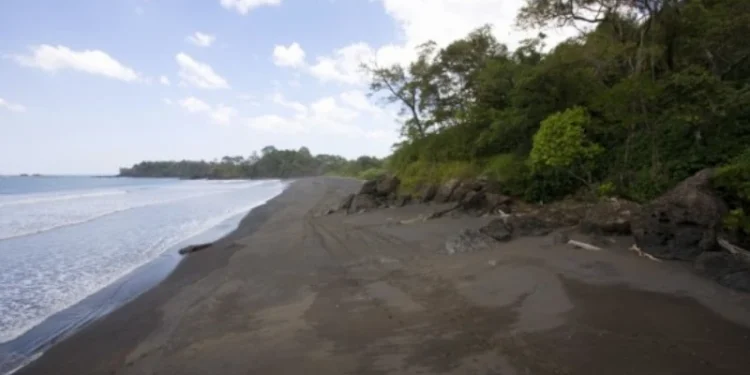My favorite spot in Paris is the center of the Tuileries.
Standing in that garden lane, you have the Louvre on one side and Place de la Concorde and its obelisk on the other.
Beyond Concorde is the Champs-Élysées and its triumphal arch.
If you shift your head slightly, you can see the Eiffel Tower.
The Tuileries are the work of Catherine de Medici, a wicked woman, mother to three French kings, famous for sacrificing her children, her country, and her principles for power.
Alas, another contradiction in human history.
I can’t help but thank the monstrous woman for her part in the efforts that, over centuries, created the spot where I feel grateful to be alive every time I pass through. If I hadn’t become a writer, I imagine I could have been an architect.
Along the Veraguas coast Lief and I were pioneering, Los Islotes presented a chance for me to indulge that smoldering passion.
There, nature seemed to extend a challenge. Dear humans, could you make a place for yourself here that would do justice to the Eden I’ve provided, that marries the best you’re capable of with my finest handiwork?
Perhaps we could try.
I knew I couldn’t create a new Paris in my lifetime, but I could lay a foundation.
I could plan a city in the tradition of the cities the Spanish created but with an important difference. The people whose land the Spanish seized for their cities did not benefit. The Spanish understood how to install the infrastructure of good living—facilities for education, reading, and physical and spiritual care—but denied access to the people they’d forced to do the work. I’d engineer my city shoulder to shoulder with the people of Veraguas and for our collective benefit.
The notion was so embarrassingly lofty that I dared not admit it to anyone, not even Lief. I did, though, let myself make a suggestion to Lief ’s design team.
“What if we incorporated a town center in the master plan?” I asked at our next meeting. Lief hemmed and hawed but finally went along because he’d begun to realize that we needed to set Los Islotes apart. Lots weren’t flying off the shelf. A commercial space, as Lief relegated the idea, would make our situation at Los Islotes less isolated.
Our architect, Ricardo, appreciated what I was really suggesting—not a spruced-up strip mall, as I feared Lief imagined, but a classic colonial town square—and he was delighted by the idea. I had an ally. It was a place to start.
Now, Los Islotes, which had seemed a burden, was an opportunity.
This was my chance to create on a grand scale. If I embraced the dream to build something outstanding and lasting, the rest of my life would be determined. That decision would influence every choice to follow. I was okay with that.
I had the sense that every decision I’d made before had led me to this point. I’ve always dreamed big, and I believe that key to making a dream come true is telling yourself that it can. The strategy had always served me well, though I’d never let my fantasies run this wild before.
I wasn’t so taken with my fantasy that I lost sight of the fact that I had no reasonable reason to think I could pull it off.
First, I’m a direct-response publisher. I have no business creating cities—no experience in urban planning, in pouring concrete, in designing bridges, or in figuring out how many public restrooms per capita.
Second, Lief had made it clear he wasn’t interested in building a city for the ages. He wanted to pull profits from Los Islotes and move on to a next project.
Third, I had nothing like the funding required. We barely had the financial resources to build a resort community.
Fourth, the Los Islotes labor pool was thin. Most in the villages around us hadn’t been to school beyond the sixth grade. Many couldn’t read. I doubted any of them had seen the kind of city I was imagining. Their houses had dirt floors and openings where the doors should have been. Even if I pulled off a miracle and wrangled my idea onto paper, found a source for unlimited funds, and got Lief on board, where would I source craftsmen to execute my grand plan?
I wrestled with each of these hurdles before I closed my eyes every night, but I set the concerns aside each morning. Sunshine helps me to keep my worries at bay.
If I’d been honest with myself, I would have admitted that none of those practicalities was the real impediment. The real obstacle was the cultural divide. It didn’t occur to me until we were too far along the path to retreat, but I was conceiving big changes for a place that’d never asked for any.
I grew up taking for granted that development is a good thing, but that was before I knew a place as undeveloped as this one.
Early in my career, an expat friend in Belize shared an insight. Mick had built a jungle lodge in Cayo. Travel + Leisure ranked it among the best hotels in the world. Mick had started from nothing. He’d bought a piece of land on a river in a place he’d never seen for $300 from a guy he met in a bar in Belize City. Mick and his wife Lucy worked over decades to turn raw jungle into world-class luxury.
“Our greatest challenge,” Mick told me once, “has been the Belizeans. They’re wonderful. Welcoming. Many have become great friends. We love being part of their country and their culture. But we’ve been living here fifteen years, and they still don’t understand us. They’ll never understand us. And we’ll never understand them. That’s just the reality.”
I wasn’t able to fully apprehend Mick’s perspective when he’d shared it, but I’d spent enough time in developing regions since to know he had a point.
To the people of Veraguas, we’re aliens from outer space. I didn’t want it to be true, but I feared that, no matter how hard we worked to integrate among them, we always would be. We and the people of this coast have nothing in common. Except, I’d begun to realize, a respect for the coast itself. The people of Quebro value the land of their ancestors more than anything else. Instinctively, I did, too. That was a commonality to build on.
Still, I should have expected that some of the good folks of Quebro might not appreciate us outsiders showing up to show them how they could live better.
I could have predicted but didn’t that my hardest job wouldn’t be building a city. My real trial would be avoiding a war.
Until next time,

Founding Publisher, Overseas Opportunity Letter











